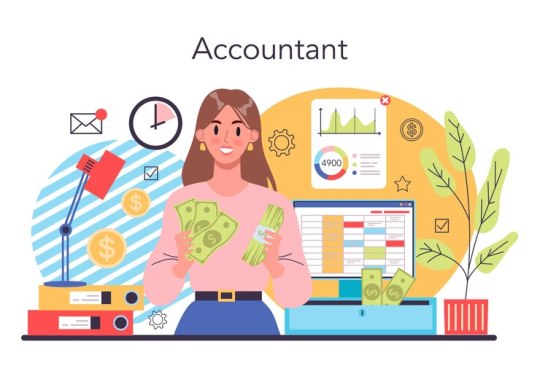#small business accounting services
Explore tagged Tumblr posts
Text

Small business accountant
To get into the risk free accounting, you have to consult the small business accountant professionally. At Custom Accounting CPA, the services are always exceptional and notice changes in tax and finance accounting.
0 notes
Text

Abletax Business Solutions offers exceptional business tax planning services in Melbourne, which are dedicated to helping small businesses navigate the complexities of tax compliance and financial management.
Our small business tax accountants expertise ensures your business remains compliant while optimising your financial strategy to enhance cash flow and profitability.
We understand businesses' challenges in maintaining profitability amidst rising expenses, and our solutions are tailored to meet these needs effectively.
By working with a professional accounting firm like Abletax, you can focus on your business's core operations while we handle the intricacies of tax planning and compliance.
Our comprehensive services are centred around evaluating your financial situation to implement effective tax strategies that benefit your business. We take a client-focused approach, ensuring you receive personalised advice and solutions catering to your needs. From minimising unexpected tax liabilities to advising on financial structures that promote growth, our team is dedicated to your financial success.
Critical services offered by Abletax include:
Comprehensive Tax Planning: We provide tailored tax strategies that help maximise your business's financial health by reducing tax liabilities and ensuring compliance with current tax laws.
Self-Managed Super Funds (SMSF): Our expert team manages all aspects of SMSF, from setup to compliance, ensuring your superannuation funds are optimally structured and managed for maximum benefit.
Small Business CGT Concessions: We specialise in small business capital gains tax concessions, helping you take advantage of available exemptions to save significantly on asset sales.
With Abletax Business Solutions, you gain access to a team of dedicated professionals who are always ready to assist you in reaching your financial goals. Our strategic business tax planning in Melbourne is designed to support your business growth efficiently.
Contact us today to discover how you can enhance your financial strategy while ensuring compliance with the reliable services offered by Abletax. Let's elevate your approach!
#small business tax accountants#business tax planning melbourne#accountants in cheltenham#small business accounting Services#Able Tax Solutions
0 notes
Text
Hire an expert accounting agent to meet financial goals
For the overall success of an enterprise, it is vital to sustain a constant track of the finances. Now, most business owners are not professionally adept, nor do they have the time to evaluate financial operations and transactions. Thus, it is vital to hire professionally qualified and highly experienced accountants offering multidimensional services, including the protection of the truthfulness…

View On WordPress
0 notes
Text
Accounting and Taxation Training Course
Improve your financial skills with the Accounting and Taxation Training Course in Nepal at Three R.C. Accounting. Our expert-led program covers essential topics in accounting, VAT, and tax regulations. It will prepare you for a successful career in finance and management.
#accounting consultancy services#small business accounting services#financial advisor and planner#Accounting and Taxation Training Course
0 notes
Text
Essential Small Business Accounting Services
Small business accounting services encompass a range of essential financial tasks tailored to meet the unique needs of entrepreneurs and small business owners. From bookkeeping to tax preparation, these services are designed to streamline financial processes and provide valuable insights into the health of your business.
0 notes
Text
A valid GST invoice
A valid GST invoice is a document issued by a registered GST taxpayer to another party for the supply of goods or services. It serves as proof of the transaction and includes specific details required by tax authorities for compliance with GST regulations. Here are the key elements that make a GST invoice valid:
1. Supplier & Recipient Information: The invoice should contain the name, address, and GST Identification Number (GSTIN) of both the supplier (seller) and the recipient (buyer).
2. Invoice Number and Date: Each invoice must have a unique identification number and the date of issue. Sequential numbering of invoices is recommended for tracking purposes.
3. Description of Goods or Services: A detailed description of the goods or services supplied, including quantity, unit price, and total value, should be provided. It's essential to accurately describe each item to ensure transparency and compliance.
4. GSTIN of the Supplier: The supplier's GSTIN must be prominently displayed on the invoice to identify them as a registered taxpayer.
5. GST Amount and Tax Rates: The invoice should specify the applicable GST rates for each item, along with the corresponding tax amounts. Separate amounts for Central GST (CGST), State GST (SGST), Integrated GST (IGST), and Union Territory GST (UTGST) may be applicable depending on the nature of the transaction.
6. Total Invoice Value: The total amount payable, including GST, should be calculated and indicated on the invoice.
7. Payment Terms and Due Date (if applicable): If there are any specific payment terms or a due date for payment, they should be mentioned on the invoice.
8. Signature or Digital Signature: The invoice should be signed by the supplier or bear a digital signature, certifying its authenticity.
0 notes
Text
Best Practices for Invoicing Software Security

Invoicing is crucial in today's world. It requires efficiency, yet software brings risks. Key details—client info, bank data, transactions—face cyber dangers. Breaches, fraud, and unauthorized entry jeopardize data. Neglecting invoicing software security can lead to harm: financial losses, damaged reputations, and legal troubles.
Practices for Invoicing Software Security
Securing this software needs layered measures, safeguarding data, controlling access, and reinforcing systems. These critical practices enhance invoicing security: data encryption, rigorous access controls, routine updates/patches, activity monitoring, secure backups, and incident response planning. A comprehensive strategy covers all risks. Companies must prioritize invoicing data safety to avoid catastrophic consequences.
Data encryption: Robust encryption algorithms are crucial to protecting sensitive financial data at rest and in transit. Encryption ensures that even if data is intercepted, it remains indecipherable to unauthorized parties.
Access control and authentication: Implementing strong access control measures, such as role-based permissions and multi-factor authentication, helps prevent unauthorized access to invoicing software and sensitive data. These measures ensure that only authorized personnel can access and manipulate financial information.
Regular software updates and patching: Keeping invoicing software up-to-date with the latest security patches and updates is essential to address known vulnerabilities and mitigate emerging threats. Software vendors frequently release updates to address security flaws, and promptly applying these updates is crucial for maintaining a secure invoicing environment.
Secure communication protocols: Encrypt all communication between the invoicing software and external systems, such as payment gateways or client portals, using HTTPS and SSL/TLS. This protects sensitive data from interception and tampering during transmission.
Audit trails and activity logging: Implementing comprehensive audit trails and activity logging mechanisms to track and record all actions performed within the invoicing software. This provides visibility into potential security breaches, facilitates incident response, and aids in forensic investigations.
Backup and disaster recovery plans: Establishing robust backup and disaster recovery strategies to ensure the availability and integrity of financial data in the event of system failures, cyber-attacks, or natural disasters. Regular backups and tested recovery procedures help minimize disruptions and data loss.
Protecting Sensitive Financial Data
Safeguarding sensitive financial data is a critical aspect of invoicing software security. This section explores two key elements:
Importance of data encryption
Keeping sensitive money details safe is very important. Encrypting data scrambles information so only authorized parties can read it. Even if someone gets the data, encryption prevents understanding it. Organizations use {encryption for client billing details, bank account numbers, and transaction records. Encryption should secure data stored on devices and data sent over the internet.
Secure storage and transmission of financial information
Along with encrypting data, invoice software should securely store and send financial data. Sensitive information gets stored in secure databases or encrypted file systems. Data gets sent over secure communication channels like HTTPS or virtual private networks (VPNs). Strict control limits access to storage systems and communication channels.
Streamline Your Business Finances With Jaz
Invoicing software security is critical for safeguarding financial data. Key practices include data encryption, strong access controls, regular updates, secure communications, activity logging, and robust backup strategies. These measures protect against cyber threats, unauthorized access, and data loss, ensuring the integrity and confidentiality of financial transactions and maintaining trust and compliance.
Jaz is an all-in-one accounting solution built to simplify and automate your most complex accounting tasks, such as invoices, bills, bank reconciliations, payments, and more, so you can get back to growing your business or serving more clients.
Get Started for free and take control of your financial operations with Jaz.
#accounting#accounting software#finance#fintech#small business accounting services#small business owner
0 notes
Text
Accounting Strategies for Small Business Victory: A Comprehensive Guide

Accounting serves as a cornerstone for small businesses, offering crucial financial insights, facilitating cash flow management, uncovering development opportunities, and streamlining tax filing procedures. Whether you opt to manage accounting tasks independently or enlist the support of a small business accountant in Calgary, ensuring a robust accounting setup can greatly benefit your venture.
While it’s true that running a small business doesn’t necessarily demand an intricate understanding of financial accounting, grasping basic accounting principles is essential for steering your business toward profitability. This article delves into the fundamentals of small business accounting and furnishes time-saving financial tips to propel your enterprise forward.
How Does Accounting Benefit Your Business?
The significance of accounting extends beyond mere tax compliance and financial record-keeping; it can also enhance your appeal to clientele. Here are some ways in which proficient accounting practices can make your business more attractive to customers:
Financial Stability: Maintaining organized finances provides clarity on revenue inflows and outflows, enabling you to forecast future financial trends accurately. This foresight ensures that your business remains financially secure, allowing for uninterrupted service delivery even during challenging periods.
Improved Efficiency: Accurate accounting furnishes real-time insights into your company’s financial health, aiding in informed decision-making regarding potential investments. Whether it’s upgrading equipment to enhance productivity or refining customer service offerings, reliable financial data empowers you to allocate resources judiciously, optimizing operational efficiency.
Informed Marketing Strategies: Harnessing financial records allows for a deeper understanding of expenditure patterns and cash flow dynamics, enabling more strategic marketing initiatives. Leveraging precise accounting data, you can pinpoint opportune moments to launch marketing campaigns and gauge their effectiveness with greater precision.
Understanding Small Business Accounting Basics:
Now that you recognize the value of accounting for your business, let’s delve into the essential elements of small business accounting:
Mastering Basic Bookkeeping: At the core of effective accounting lies meticulous bookkeeping, encompassing the systematic recording of all business transactions. By diligently tracking revenues and expenses, you gain valuable insights into your business’s financial performance, ensuring tax compliance and facilitating informed decision-making.
Filing Business Tax Returns: Navigating tax obligations can be daunting for freelancers and small business owners alike. However, maintaining accurate accounting records throughout the year can significantly alleviate the stress associated with tax season. From income tax payments to sales tax remittances and payroll taxes, staying on top of your tax obligations is paramount for financial sustainability.
Generating Financial Reports: Comprehensive financial reports, such as cash flow statements, profit and loss statements, and balance sheets, furnish invaluable insights into your business’s financial health. These reports serve as indispensable tools for assessing performance, guiding strategic planning, and facilitating transparent communication with stakeholders.
Organizing Your Business Finances:
To streamline your accounting processes, consider adopting the following steps:
Establish a Separate Business Bank Account: Segregating business finances from personal accounts is essential for maintaining financial clarity and ensuring regulatory compliance. Open a dedicated business bank account to manage incoming revenue and outgoing expenses efficiently.
Implement an Expense Tracking System: Maintaining meticulous records of business expenses is crucial for monitoring financial health and simplifying tax preparation. Whether through manual record-keeping or utilizing cloud-based accounting software, establishing a robust expense tracking system is indispensable for sound financial management.
Adopt an Effective Bookkeeping Method: Choose between the cash and accrual accounting methods based on your business’s needs and preferences. While the cash method records transactions upon receipt of cash, the accrual method recognizes revenue and expenses at the time of transaction, offering distinct advantages for different business models.
Comprehend Tax Obligations: Familiarize yourself with your business’s tax obligations, taking into account factors such as legal structure and industry-specific requirements. Whether as a freelancer withholding taxes or a small business owner remitting payroll taxes, staying abreast of tax regulations is crucial for avoiding penalties and maintaining financial compliance.
Assess Scalability: As your business evolves and expands, periodically reassess your accounting practices to ensure they remain aligned with your evolving needs. Consider the feasibility of outsourcing accounting tasks to professionals as your business grows, allowing you to focus on core operations while ensuring financial integrity.
Conclusion:
Effective accounting practices are integral to the success of small businesses accountant, offering indispensable insights and facilitating informed decision-making. Whether you choose to manage accounting tasks independently or enlist professional assistance, prioritizing sound financial management can bolster your business’s resilience and longevity in an ever-changing marketplace.
#small business accounting services#accounting services#accounting#accounting service provider#accounting management#small business accountant in Calgary#Dknight Consulting
0 notes
Text
The Power Of Small Business Accounting Services

Small business accounting services wield immense power in ensuring financial stability. From bookkeeping and payroll to tax preparation, these services streamline financial processes, providing accurate insights. Professional accounting companies in Mayfield Heights OH ensure compliance with regulations, maximize tax benefits, and facilitate informed decision-making.
0 notes
Text
Navigating Harmony: The Vital Role of Reconciliation Services
In a world marked by diverse perspectives and conflicting interests, the need for reconciliation services has become increasingly evident. Whether mending personal relationships, resolving workplace disputes, or fostering peace in communities, reconciliation services play a pivotal role in navigating the complexities of human interactions. This article delves into the essence of reconciliation services, exploring their significance, methodologies, and the transformative impact they can have on individuals and societies.
The Importance of Reconciliation:
Building Bridges, Not Walls: Reconciliation services provider serve as bridges connecting individuals and communities fractured by disputes. The emphasis is not merely on resolving conflicts but on rebuilding relationships, fostering understanding, and promoting empathy.
Conflict Transformation: Unlike traditional conflict resolution, reconciliation services focus on transforming the underlying dynamics of disputes. This involves addressing root causes, acknowledging diverse perspectives, and facilitating a shift from animosity to cooperation.
Methods and Approaches:
Mediation as a Catalyst: Mediation stands as a cornerstone of reconciliation services. A neutral third party facilitates dialogue between conflicting parties, guiding them towards mutually agreeable solutions. The mediator fosters communication, encourages empathy, and assists in crafting sustainable resolutions.
Restorative Justice Practices: Reconciliation services often incorporate restorative justice principles, aiming to repair the harm caused by conflicts. This approach involves bringing offenders, victims, and communities together to collectively address the consequences of wrongdoing and work towards healing.
Counseling and Emotional Support: Recognizing the emotional toll of conflicts, reconciliation services may include counseling and emotional support mechanisms. Trained professionals help individuals navigate the psychological impact of disputes, fostering emotional resilience and paving the way for reconciliation.
Real-World Applications:
Family Reconciliation: In familial conflicts, reconciliation services can provide a structured and supportive environment for open communication. This allows family members to address grievances, rebuild trust, and strengthen bonds for a healthier coexistence.
Workplace Harmony: Within the workplace, reconciliation services contribute to a positive and productive environment. Resolving conflicts among colleagues or between employees and management fosters a culture of collaboration and innovation.
Community Healing: In communities scarred by historical or ongoing disputes, reconciliation services become agents of healing. By facilitating dialogue, acknowledging past injustices, and promoting inclusivity, these services contribute to community cohesion and resilience.
Challenges and Future Perspectives:
Resistance to Change: Embracing reconciliation often requires a willingness to change perspectives and let go of deeply entrenched grievances. Overcoming resistance to change remains a significant challenge in the implementation of reconciliation services.
Resource Allocation: Adequate resources, both financial and human, are crucial for the success of reconciliation services. Ensuring sustainable funding and staffing is essential for these services to effectively address conflicts on various scales.
Conclusion:
In a world marked by divisions, the role of reconciliation services is indispensable. From interpersonal relationships to societal harmony, these services provide a framework for transformative change. By fostering understanding, empathy, and resolution, reconciliation services contribute to the creation of a more cohesive and compassionate world. It is through these efforts that individuals and communities can navigate the path towards reconciliation services in usa , healing, and a brighter, harmonious future.
#reconciliation services in usa#managment reporting services in usa#small business accounting services
0 notes
Text
Get individual accounting services with 4 top merits
Financial control is essential for the accomplishment and compliance of any individual business, irrespective of it being small-scale, or mid-sized. To ensure the flourishing of business and avoid monetary involvements, highly competent and certified accountants need to be hired by individual clients. These optimally experienced accounting firms or accountants can deliver priceless support with…

View On WordPress
#accountant small business#accounting bookkeeping service#professional accounting services#small business accounting services
0 notes
Text
Why does your Business Need a Financial Advisor and Planner?
Our services will assist you in preparing for the unexpected, and in the event of market turbulence, an experienced third party can provide you with the confidence you require to continue operating, as emotional reactions may easily impact financial decisions in such circumstances. We match our clients with the ideal Financial Advisor and Planner to assist them meet their individual needs. With over 30 years of experience, we strive to give our clients with the best possible services. A financial counsellor and planner can help you manage investments such as stocks, mutual funds, and bonds, as well as identify the best way to handle and pay off debt.
#financial advisor and planner#accounting consultancy services#small business accounting services#bookkeeping services
0 notes
Text
5 Small Business Tax Tips to Less Stressful Tax Time
Tax season can be a daunting time for small business owners, with the pressure of ensuring accurate financial reporting and meeting deadlines. However, there are proactive measures that entrepreneurs can take to make this period less stressful and more manageable. Following are, five strategies to ease the tax season burden for business owners:
Organize Your Financial Records Throughout the Year
One of the most effective ways to alleviate tax season stress is to maintain organized financial records throughout the year. Implementing a robust accounting system and diligently recording income, expenses, and receipts on a regular basis will save you from the last-minute scramble. Consider using accounting software or hiring a professional bookkeeper to streamline the process. When tax season arrives, you’ll be grateful for the comprehensive and well-organized documentation that allows for a smoother filing experience.
Stay Informed about Tax Regulations and Deductions
Tax laws and regulations are subject to change, and staying informed about these updates is crucial for business owners. Deductions, credits, and exemptions can significantly impact your tax liability. Regularly consult with a tax professional to ensure you are aware of any changes that may affect your business. By staying informed, you can take advantage of available opportunities to reduce your tax burden and optimize your financial position.
Make Quarterly Estimated Tax Payments:
Avoid the shock of a hefty tax bill by planning for estimated tax payments throughout the year. Business owners, especially those with irregular income, can benefit from making quarterly estimated tax payments to the Internal Revenue Service (IRS). This approach helps distribute the financial burden and prevents the accumulation of a large tax liability. Work closely with your accountant to determine the appropriate amount for each quarterly payment based on your projected income.
Engage a Tax Planner/Tax Preparer:
A tax planner can reduce tax liability significantly by utilizing the most tax-efficient tax structure, recommending effective retirement and investment strategies, navigating complex state and local tax laws, and maximizing deductions. Tax laws are complex and can be overwhelming, but professionals are trained to navigate these intricacies. Additionally, having a professional review your financial records throughout the year can identify potential issues before they become significant problems.
Leverage technology to streamline your tax-related processes:
Cloud-based accounting software, expense tracking apps, and electronic document management systems can simplify record-keeping and make it easier to access and share financial information. Automating repetitive tasks not only saves time but also reduces the risk of errors. Explore available tools and integrate them into your business operations to enhance efficiency and accuracy.
Tax season doesn’t have to be a source of stress for business owners. By adopting these proactive strategies, you can navigate this annual challenge with confidence and ease. Remember to stay organized, stay informed, plan ahead, seek professional assistance when needed, and leverage technology to streamline your financial processes. Taking these steps will not only make tax season less stressful but also contribute to the overall financial health and success of your business.
For more information about Best Tax Accountant NYC, visit our website: https://stepanchukcpa.com/
Reference: https://stepanchukcpa.com/5-small-business-tax-tips-to-less-stressful-tax-time/
0 notes
Text
Best and Cheapest GST billing software in India
In my perspective, while there are several GST billing software options available in India, one standout solution that combines affordability with robust features is BUSY Accounting Software. Here's why:
1. BUSY Accounting Software: BUSY offers comprehensive GST billing features at an affordable price point, making it an excellent choice for small and medium-sized businesses in India.
- With BUSY, you can easily generate GST-compliant invoices, manage inventory, track expenses, and reconcile accounts, all within a user-friendly interface.
- Its customizable features and scalability make it a versatile solution for businesses of all sizes.
In addition to BUSY, here are a few other noteworthy GST billing software options in India:
#gst software#accounting software#accountingsoftware#small business accounting services#financial planning#gst registration#inventory software
0 notes
Text
Small Business Tax Preparation Checklist in the Philippines

Every year, tax filing stresses small businesses in the Philippines. Good tax prep isn't just a rule—it's critical for financial wellness. Innovative filing cuts stress and time, ensuring claims on all legal deductions. Accounting apps simplify things hugely now. Software collates data meticulously and precisely, making tax prep easy.
Checklist for Preparing Small Business Taxes in the Philippines
Let's make tax prep simple for small companies. Our checklist helps you through critical tasks to do taxes right. It's a great tool for handling paperwork and filing correctly. Everything gets taken care of.
Organizing Financial Documents is the first critical step. Ensuring that all financial documents, including sales records, expenses, and bank statements, are well organized is fundamental. These documents form the backbone of your tax file, serving as proof of your business's financial activities throughout the year.
Reviewing Business Transactions within the fiscal year for accuracy and completeness is crucial. No matter how small, every transaction impacts your financial statements and, consequently, your tax liabilities. Overlooking or inaccurately recording transactions can lead to discrepancies that may trigger audits or result in missed tax-saving opportunities.
Utilizing Accounting Software can significantly simplify this process. Modern accounting solutions automate the tracking and organization of financial data, reducing the likelihood of errors and saving hours that would otherwise be spent manually sorting through records. These tools are about convenience, accuracy, and efficiency, ensuring your financial data is tax-ready.
Identifying Deductible Expenses is another area where small businesses can benefit significantly. Understanding local tax laws is imperative to recognize which expenses can be deducted, such as operational costs, home office expenses, and employee salaries. This knowledge is vital in reducing overall taxable income, potentially lowering tax liabilities.
Understanding Tax Obligations for Small Businesses in the Philippines
Businesses must grasp the different taxes they owe. Key ones include Income Tax, VAT, Percentage Taxes, and Local Business Taxes. Crucially, each has its due dates, exemptions, and rates. Owners must know these details to comply and minimize tax bills.
Income Tax filing involves calculating the business's net income and applying the appropriate tax rates. Meeting filing deadlines is critical to avoid penalties.
VAT and Percentage Taxes serve different functions and apply to businesses based on their sales thresholds and the nature of their operations. Knowing whether your business is subject to VAT or eligible for percentage tax exemptions can significantly impact your financial planning.
Local Business Taxes vary depending on the business's location, requiring owners to be acquainted with the tax ordinances of their respective local government units.
Common Mistakes in Tax Preparation and How to Avoid Them
Familiar errors when doing taxes comprise misclassifying expenses, keeping messy financial records, and late filing or paying. Such mistakes may cause unneeded money problems from penalties or missed deductions. Using accounting software helps avoid these hazards. It makes sure money details are correct and sorted well. It reminds you of key due dates. And it keeps business and personal cash entirely apart.
Streamline Your Business Finances With Jaz
This blog post provides a tax preparation checklist for small business owners in the Philippines. It organizes financial documents, reviews transactions, utilizes accounting software, and identifies deductible expenses. It also outlines an understanding of tax obligations like income tax, VAT, percentage taxes, and local business taxes and how to avoid common mistakes such as misclassifying expenses and late filing. The aim is to simplify tax filing, encourage compliance, and suggest accounting software as an essential tool for efficient financial management.
Jaz is an all-in-one accounting solution built to simplify and automate your most complex accounting tasks, such as invoices, bills, bank reconciliations, payments, and more, so you can get back to growing your business or serving more clients.
Get Started for free and take control of your financial operations with Jaz.
#accounting#accounting software#finance#fintech#small business accounting services#small business owner
0 notes
Text
Hire Qualified Tax Accountants in St Kilda for Getting Beat Financial Services
Renowned accounting companies provide professional tax accountants in St Kilda who have undergone financial training to provide high quality financial services using wide knowledge, innovative solutions and the most effective strategies. These tax accountants can offer a variety of services that are appropriate for both individual and corporate clients, including tax preparation. They assert that when their clients hire them, they receive the outcomes they want. Before completing any tax returns on your behalf, these accountants promise to carefully analyse all aspects of Australia's tax legislation. By taking into account all potential deductions, they utilize their in-depth understanding of taxes to maximize your tax refund and make sure you pay the least amount of tax possible. These tax preparers offer services for both individual and corporate tax preparation.

These tax accountants also provide small business accounting services such as accounting & bookkeeping, benchmarking, budgeting, cash-flow forecasting, management consulting and more at reasonable prices. They contend that by handling all of your bookkeeping and accounting requirements, including the creation of your annual accounts and periodic management accounts for tax, business appraisal, and planning purposes, these small business accounting services can relieve you and your team of a great deal of burden. As part of their small business tax preparation, business evaluation, and planning services, they will regularly discuss your needs and offer customized information and helpful recommendations. They promise that you can see how your company stacks up against the competition with their precise, timely, and comprehensive benchmarking and other reports. Summarise the workings of your sector as well as others.
Importance of Hiring Qualified Tax Accountants:
Accountants for tax returns are said to be a great resource for any person or company, according to a number of websites. They can assist with filing taxes, offer tax advice, and make sure that all available deductions are taken. Possessing the necessary training and expertise, they can offer wise counsel on effectively and lawfully handling taxes. In the end, choose the correct accountant is a crucial choice that should not be made hastily because it can have long-term effects on your company's finances. To provide their clients with the most accurate advice possible, tax accountants maintain up to date information on the latest advancements in the field.
To conclude, accounting companies provide expert tax accountants for your various financial services such as tax return, bookkeeping, accounting and more. Someone looking for these services should contact a nearby accounting company.
Source
0 notes